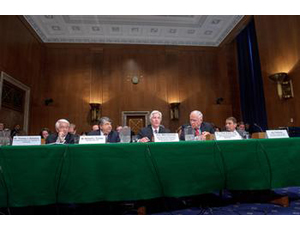
Senate Environment and Public Works Committee Chairman Barbara Boxer (D-Calif.) says she is aiming to have a new, multi-year surface-transportation bill ready for a vote by her panel in April.
But because the Boxer committee’s jurisdiction is limited to highway policy, it will be up to the Finance Committee to tackle the most critical issue for surface transportation: finding revenue to shore up the faltering Highway Trust Fund.
At a Feb. 12 committee hearing on reauthorizing the current transportation measure, the 2012 Moving Ahead for Progress in the 21st Century Act (MAP-21), Boxer said she is hoping to roll out a five- or six-year bill.
The powerful Senate Finance panel has just gotten a new chairman, Ron Wyden (D-Pa.). He took over the gavel from Max Baucus (D-Mont.), who was confirmed on Feb. 6 as U.S. ambassador to China.
Boxer said she has spoken to Wyden about the transportation issue. At her committee's hearing, she elicited pledges from industry and labor leaders testifying before the panel that they would contact Wyden as well as the Finance Committee’s top Republican, Orrin Hatch (Utah), about transportation funding.
Lawmakers and state and industry witnesses at the hearing noted the need to address the trust fund’s woes. Recent projections show the fund's highway account could dip into the red as early as August, which is weeks or months sooner than previously expected.
Testifying for the American Association of State Highway and Transportation Officials (AASHTO), Michael Hancock, Kentucky transportation cabinet secretary, said that, to avoid a highway-account insolvency, the Federal Highway Administration might have to alter its curent schedule of daily reimbursing states for their highway outlays. Hancock said FHWA could be forced to shift to weekly or biweekly reimbursements to conserve cash.
Hancock said AASHTO wants, at a minimum, the new bill’s funding to be enough to continue MAP-21’s spending levels, plus increases to account for inflation.
The source for that funding is the biggest open question. Backing a hike in the federal gasoline tax are Thomas Donohue, U.S. Chamber of Commerce president and CEO; Peter Ruane, American Road & Transportation Builders Association president and CEO; and Richard Trumka, AFL-CIO president.
But the committee’s top Republican, David Vitter (La.), said he is seeking a solution to the trust fund’s problem that avoids “a net tax increase.”
He also signaled he wants to focus spending on bridges and highways and not on activities that “don’t build infrastructure.”
Republicans on the Environment and Public Works Committee also indicated they wanted the new transportation bill to include provisions to speed up federal agencies’ reviews of projects.


Post a comment to this article
Report Abusive Comment